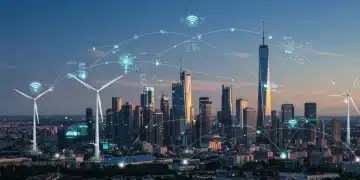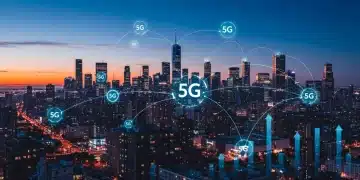Smart city infrastructure projects expanding opportunities
Smart city infrastructure projects expand opportunities by integrating advanced technologies like AI and sustainable practices, enhancing urban living through improved efficiency, connectivity, and quality of life for residents.
Smart city infrastructure projects expanding are changing the way we live, work, and interact in urban spaces. Have you ever wondered how these initiatives can enhance your daily life? Let’s dive into the transformative power of smart city projects.
Understanding smart city infrastructure
Understanding smart city infrastructure is essential as cities evolve. These systems enhance the quality of life for residents and improve urban management. Smart cities rely on technology to offer better services, making urban living more efficient.
Key Components of Smart City Infrastructure
This infrastructure consists of various interconnected systems and technologies. By integrating these elements, cities can reduce costs and streamline services.
- IoT Devices: Sensors and devices collect data to monitor traffic and pollution.
- Data Management: Centralized platforms analyze data for effective decision-making.
- Communication Networks: High-speed internet facilitates real-time communication between systems.
Additionally, smart infrastructure addresses urban challenges such as traffic congestion and energy consumption. By using intelligent solutions, cities can adapt to changing demands and improve sustainability.
Benefits of Smart City Infrastructure
Investing in smart city infrastructure brings multiple advantages. It fosters innovation and attracts businesses and talent. Moreover, it enhances citizen engagement, as developers can provide better services tailored to community needs.
Citizens benefit from improved public services and a higher quality of life. For instance, smart traffic lights can adjust to real-time traffic, reducing congestion and travel times.
- Energy Efficiency: Smart grids help optimize energy distribution, reducing waste.
- Sustainable Practices: Green spaces and eco-friendly technologies promote environmental responsibility.
- Public Safety: Equipped with surveillance and emergency response systems, cities can ensure safety for all.
As cities continue to embrace smart infrastructure, they pave the way for a more connected and efficient future. Using technology not only benefits local governments, but also improves the overall urban experience for residents.
Key benefits of expanding smart city projects

Expanding smart city projects brings numerous benefits that can transform urban life. These initiatives create a more connected and efficient environment for residents, while also addressing various urban challenges.
Improved Quality of Life
With the introduction of smart technologies, residents experience enhanced services and amenities. For example, smart public transportation systems provide timely information, making commuting easier and less stressful.
- Reduced Traffic Congestion: Real-time data helps manage traffic flow.
- Safer Communities: Integrated security systems increase safety for residents.
- Better Public Services: Centralized information systems streamline service delivery.
As these projects expand, the overall quality of life in cities improves significantly. Access to smart systems allows for more responsive governance and better resource allocation.
Economic Growth
Expanding smart city projects also fosters economic development. These initiatives attract businesses and create jobs, boosting local economies. Smart infrastructure supports innovation and entrepreneurship, offering a solid foundation for growth.
Investing in technology leads to new opportunities for residents and businesses alike. As companies are drawn to technologically advanced locations, cities become hubs of innovation.
- Increased Investment: Attracts both local and foreign investors.
- Job Creation: New projects generate employment opportunities.
- Sustainable Development: Eco-friendly initiatives promote long-term economic sustainability.
Ultimately, the expansion of smart city projects contributes to a vibrant economic landscape, ensuring that cities remain competitive in the global market while enhancing livability for citizens.
Challenges faced in implementation
Implementing smart city projects presents unique challenges that cities must navigate. These challenges can impact the effectiveness and sustainability of each initiative. Understanding these obstacles is crucial for successful execution.
High Initial Costs
One significant barrier is the high upfront costs associated with technology and infrastructure upgrades. Cities often face budget constraints, making it difficult to invest in necessary smart technologies from the outset.
- Funding: Many cities rely on government grants and public-private partnerships.
- ROI Calculation: It can be tough to predict long-term returns on investment.
- Budget Allocation: Balancing various city needs can limit available funds for smart projects.
Despite these initial hurdles, cities can strategize funding and implement phased approaches to mitigate costs.
Data Privacy and Security Concerns
Another major challenge involves ensuring data privacy and security. As cities gather extensive data through smart technologies, protecting this information is paramount. Public trust hinges on transparency and security measures.
Moreover, managing cybersecurity risks is essential. Cities must address potential vulnerabilities to avoid breaches that could compromise sensitive data.
- Compliance: Adhering to privacy regulations can complicate data usage.
- Infrastructure Security: Systems need robust defenses against cyber threats.
- Public Awareness: Educating citizens about data use helps build trust.
Addressing these challenges requires a well-thought-out approach to ensure that smart city initiatives can thrive while safeguarding citizen privacy.
Integration with Existing Systems
Integrating new technologies with legacy systems poses a further challenge. Many cities operate on outdated infrastructure that may not be compatible with modern smart solutions.
Effective integration is crucial to maintaining operational continuity and avoiding service disruptions. Cities often need to invest time and resources into upgrading these systems.
- System Compatibility: Ensuring new technologies work with existing setups is vital.
- Training Personnel: Staff must understand both old and new systems.
- Incremental Upgrades: Gradually enhancing systems can ease the transition.
By strategically addressing these integration issues, cities can create a more functional environment for their smart city projects.
Future trends in smart city infrastructure

Future trends in smart city infrastructure promise to reshape urban landscapes dramatically. As technology continues to evolve, cities are embracing innovative solutions to improve the quality of life for their residents.
Integration of Artificial Intelligence
One major trend is the increasing use of artificial intelligence (AI) in city management. AI can analyze data to optimize traffic systems and enhance public safety. By implementing intelligent algorithms, cities can make real-time decisions based on current conditions.
- Traffic Management: AI systems can adjust traffic lights to reduce congestion.
- Predictive Maintenance: AI can anticipate when equipment needs repair, saving costs.
- Emergency Response: AI can streamline response times using data analysis.
With such applications, cities can become more responsive and efficient, benefiting everyone.
Emphasis on Sustainability
Sustainability is another key focus for future smart cities. These cities are adopting eco-friendly practices to minimize their environmental impact. Innovations in renewable energy sources and resource management are becoming widespread.
Smart grids are an excellent example of this trend. They facilitate the efficient distribution of energy and allow consumers to manage their energy use more effectively. Additionally, green buildings that incorporate smart technologies help reduce energy consumption.
- Smart Waste Management: Sensors can optimize garbage collection schedules.
- Water Conservation: Smart irrigation systems ensure efficient water use in public spaces.
- Urban Greenery: Initiatives to plant trees and create parks promote biodiversity.
By focusing on sustainability, cities can work towards healthier environments for future generations.
Enhanced Connectivity and Mobility
Future smart cities will also emphasize enhanced connectivity. 5G technology is paving the way for faster communication between devices, leading to innovations in public transportation and mobility solutions.
Smart transportation systems can offer real-time updates to commuters and encourage the use of public transit. These systems will interconnect various transport options, from buses and trains to bike-sharing programs, creating a seamless travel experience.
- Autonomous Vehicles: Self-driving cars will improve road safety and reduce traffic.
- Mobility as a Service (MaaS): Integrated apps will simplify travel planning.
- Smart Parking: Real-time information will help drivers find parking spots quickly.
Ultimately, by embracing these trends, cities can create innovative, efficient environments that improve residents’ daily lives while fostering sustainable growth.
In conclusion, the future of smart city infrastructure is full of exciting possibilities. As cities increasingly adopt new technologies, they can improve the quality of life for residents and promote sustainable practices. Emphasizing AI, sustainability, and connectivity will help urban areas become more efficient and environmentally friendly. By addressing the challenges faced during implementation, cities can pave the way for a brighter future where innovation and livability go hand in hand.
FAQ – Frequently Asked Questions about Smart City Infrastructure
What are the main advantages of implementing smart city projects?
Smart city projects improve quality of life, enhance sustainability, and promote economic growth by utilizing technology to optimize services.
How does artificial intelligence contribute to smart cities?
AI helps in traffic management, predictive maintenance, and quick decision-making, making city services more efficient and responsive.
What challenges do cities face when implementing smart technologies?
Cities often encounter high initial costs, data privacy concerns, and integration issues with existing infrastructure.
How can smart cities enhance mobility for residents?
Smart cities can improve mobility through integrated public transportation systems, real-time data for commuters, and advancements like autonomous vehicles.





